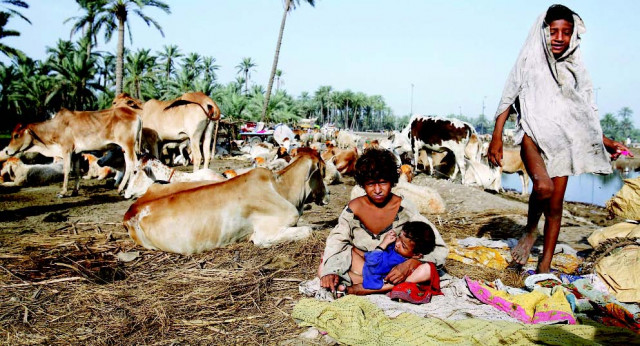Anguished farmers wait till the cows can come home
Karim Dino Shar is applying a paste of tumeric and oil to a goat’s leg at a camp near the new bus terminal in Sukkur.

“This is my dearest goat,” he says. “She is a lovely one and has so far given birth to eight kids.” While they were wading through the water towards the main road, she got caught in the bushes and was hurt. One of her legs is bruised and swollen.
Shar and other livestock farmers who are waiting for the waters to go down in Jacobabad, Kashmore and Shikarpur, are struggling to keep their animals alive. But most of the buffaloes, cows, goats and sheep with them don’t look fit.
Part of the problem is fodder. Relief camps are serving humans but there is no grass or bushes for the animals to graze on. “Even animals feel bad when they are displaced from their habitat,” says Shar, who owned 10 goats and a cow. “In Ghouspur, there was ample fodder but here in Sukkur, they are hungry and it’s painful for me to see them in this condition.”
The animals were bitten by snakes and attacked by wild boar. Two of Khaliq Dino’s buffaloes died of snakebite. “I had three buffaloes,” he says. “I managed to save this Bhoori but even she was attacked.” The Bhoori is a type of buffalo famous for giving more milk, which is sweeter than what the others produce. This animal was attacked by leaches. “They are blood-sucking leaches that often stick to buffaloes in the water,” Khaliq Dino explains. They have left rashes on her stomach and when they are pulled off, they leave a wound that takes a long time to heal.
In the meantime, the animal stops eating and producing milk.
Abdul Rahim Lashari’s cow was attacked and injured by a wild boar. A vet is treating the wound, about three inches deep, in her hind leg. “Animals are more sensitive than humans and if they go through any shock, they stop eating,” he says. “My cow used to be a playful cow, but since she was attacked she has been in a state of shock.”
Lashari, who had brought a herd of 14 goats to Sukkur, was unhappy when he lost two of them. One was crushed by a truck and the other died giving birth. “Goats are the most sensitive among domestic animals,” he says. “If you don’t give them proper attention, they will become ill.”
Dr Ahmed Sanghrani, a vet who works for Thardeep, says that most of the animals he has seen are suffering from Viral Haemorrhagic Septicemia. It causes an infection in their throats, which is why they stop drinking and eating fodder, a condition exacerbated by drinking stagnant flood water.
He recommends the Haemorrhagic Septicemia (HS) vaccination that costs up to Rs200. “Keep the affected animals away from the rest so they don’t transmit the disease,” he says. Perhaps advice that not many livestock farmers can afford to follow in the relief camps.
Published in The Express Tribune, August 21st, 2010.



















COMMENTS
Comments are moderated and generally will be posted if they are on-topic and not abusive.
For more information, please see our Comments FAQ